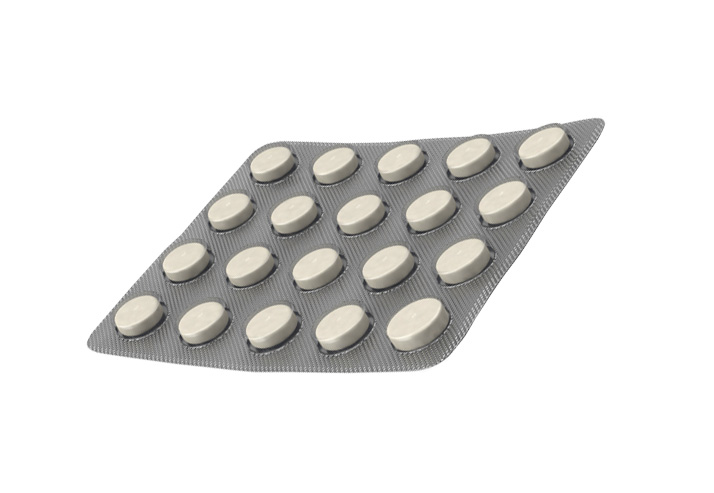Dexone
Dexone tablets contain the synthetic active ingredient dexamethasone. This steroid hormone has a more powerful effect than the corresponding physiological hormone (cortisol). It has a powerful anti-inflammatory effect, acts on the body's immune system and combats the local accumulation of water (oedema). This is why it is used to treat cerebral oedema in head injuries, cerebral haemorrhages, brain surgery, inflammation of the brain and meninges, local accumulation of pus in the brain, strokes and radiotherapy to the skull.
Dexone is also indicated for treating the following conditions: acute flare-ups of inflammatory rheumatic diseases (chronic polyarthritis), acute flare-ups of certain skin diseases (e.g. eczema), certain lung diseases (e.g. severe bronchial asthma), acute flare-ups of certain inflammatory bowel diseases, serious infectious diseases. In the treatment of tumours, Dexone is used to improve certain tumour-related disorders and to treat or prevent vomiting due to chemotherapy.
What Does Dexone Contain?

Scored tablets containing 1 mg or 4 mg dexamethasone.
Active ingredients
Dexamethasone.
Excipients
Lactose monohydrate, microcrystalline cellulose, croscarmellose sodium, magnesium stearate.
Forms and Strengths
Dexone 0.5 mg, scored tablets: packs of 20 and 100 tablets.
Dexone 1 mg, scored tablets: packs of 20 and 100 tablets.
Uses
Your doctor will have decided on the dosage of your tablets according to your particular needs, taking into account the type, severity and course of your disease. He or she will decide whether treatment with tablets should be preceded by treatment by injection, whether the dosage can be gradually reduced during the course of treatment and whether additional treatment or switching to another medicine of the same type as Dexone is necessary.
In the case of serious clinical conditions (e.g. acute flare-ups of rheumatic diseases, serious infectious diseases, certain skin, lung and intestinal diseases, tumour-related disorders, chemotherapy-related vomiting), treatment is generally started with 4 to 16 mg of Dexone per day and then continued at a lower dosage.
In children, the doctor also adapts the dose individually according to the type, severity and course of the disease; if there is a sufficient response to treatment, the dose is generally reduced in small steps and the drug is stopped as soon as possible.
If necessary, the tablets can be divided in two. The daily dose should be taken all at once in the morning with a little liquid and without chewing. For the treatment of cerebral oedema, tumour-related disorders and chemotherapy-related vomiting, it may be necessary to divide the daily dose into 2 to 4 single doses and always take the medicine after meals with a little liquid and without chewing.
Stress reaction disorder on long-term glucocorticoid therapy requires an increase in the dose of corticosteroids under stressful conditions. After long-term treatment, this disturbance of the stress response may persist, under certain conditions, for up to a year after the medication is stopped, requiring the administration of corticosteroids as a preventive measure in stressful situations! Your doctor knows what to do in such cases.
Side Effects
Increased risk of infections, masking of infections, altered blood profile, hypersensitivity reactions, moon face, trunk obesity, decreased adrenal function, accumulation of water in the body, increased potassium excretion, weight gain, increased blood sugar, increased blood fat, increased appetite, mental disorders such as depression, irritability, inner restlessness, sleep disturbances and suicidal thoughts. Epileptic seizures, glaucoma, cataracts, blurred vision, increased occurrence of eye infections, increased blood pressure, increased risk of arteriosclerosis and thrombosis, gastric and duodenal ulcers, stomach haemorrhages, gastric disorders. Skin changes (e.g. acne, formation of brownish-red streaks on the skin), increased hair growth, muscle damage, tendon damage, increased bone fragility (osteoporosis), growth retardation in children, menstrual disorders, impotence.
Please tell your doctor if you notice any of these side effects.
The risk of developing side effects can be reduced by following the recommendations below:
- Avoid gaining weight (daily weight control, adjusting calorie intake).
- Eat salt and sugar in moderation.
- Eat a diet rich in potassium (fruit and vegetables, especially apricots and bananas).
- Ensure an adequate intake of calcium (milk, dairy products).
- Ensure that you get enough protein in your diet.
- If you notice any side effects, please inform your doctor or pharmacist. This applies in particular to side effects not mentioned in this package leaflet.
Precautions
This medicine may affect reactions, driving ability and the ability to use tools or machines! These disturbances are mainly due to changes in mood, initiative and ability to concentrate.
If you are taking other medicines at the same time, this may increase the frequency of undesirable effects. Particular care should be taken when taking the following medicines: medicines to treat heart weakness, medicines to promote urinary excretion, laxatives, hypoglycaemic agents, medicines that inhibit blood coagulation, medicines to treat rheumatism, medicines to treat tuberculosis, medicines to treat epileptic seizures, medicines to treat tapeworms, sleeping pills, analgesics, medicines to treat excessive gastric acid production and heartburn, medicines to treat fungal infections, oestrogens (pill or replacement therapy after the menopause), medicines to lower blood pressure, medicines to relax muscles, medicines to treat malaria, medicines to lower the immune system and medicines to treat HIV infections.
During treatment with Dexone, you must not allow yourself to be vaccinated. Your doctor knows what to do in this case. You should also inform your doctor if you have recently travelled to a tropical country. Tell your doctor immediately if you develop an infectious disease while taking this medicine. Also inform your doctor if you suffer from gastrointestinal ulcers, pronounced bone fragility (osteoporosis), mental disorders, amoeba infections, mycotic infection of internal organs or glaucoma.
During treatment with this medicine, a pheochromocytoma crisis, which can be fatal, may occur. Pheochromocytoma is a rare hormone-dependent tumour of the adrenal glands. Possible symptoms of an attack include headaches, sweating attacks, palpitations and high blood pressure. Consult your doctor immediately if you notice any of these symptoms.
Talk to your doctor before taking Dexone tablets if a pheochromocytoma (tumour of the adrenal glands) is suspected or present.
In children under the age of 12, Dexone should only be used in an emergency. The doctor will then prescribe a dosage that takes into account the severity of the illness rather than the child's age and weight.
Consult your doctor in the event of vision problems.
Dexone tablets contain lactose. If your medicine specialists has told you that you have an intolerance to certain sugars, consult them before using this medication.
What else do you need to consider?
During treatment with Dexone, a suitable diet, medical gymnastics and other accompanying measures should be maintained if the doctor so orders.
When should Dexone not be used?
Do not use this drug if you are hypersensitive to any of the ingredients.
Pregnancy and Breastfeeding
Dexone should only be taken during pregnancy if the doctor considers it absolutely necessary. Women must inform the doctor of any presumed or established pregnancy.
If you are taking Dexone while breast-feeding, you should stop breast-feeding as small quantities of the active substance pass into breast milk. Please inform your doctor if you are breast-feeding.



